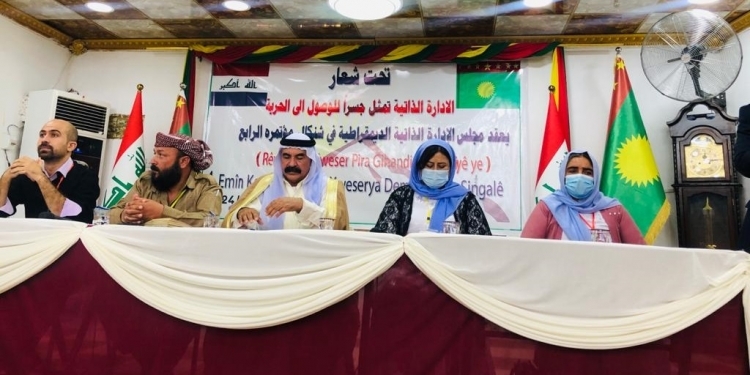Local authority in Shingal protests Baghdad’s silence towards Turkish assaults
ERBIL, KRG, Iraq (North Press) – In protest against what it described as “the government’s silence” towards the Turkish attacks, the Autonomous Administration in Shingal (Sinjar), west of Iraq, closed the official work in the government institutions on Sunday.
The Autonomous Administration of Shingal warned the Iraqi government saying, “it proved that it is no longer able to defend Shingal, which has been run by the Autonomous Administration since the expulsion of ISIS from it in 2015, and that it does not have sovereignty over it.”
The decision of closing all official government departments and institutions, as well as international organizations, with the exception of hospitals and schools, came as a form of reaction to the silence of the Iraqi central authorities.
Two Turkish assaults in less than a week
The Iraqi city of Shingal, adjacent to the Syrian border, is occasionally hit by Turkish strikes that target Yezidi leaders and civilian and military headquarters of the Autonomous Administration.
Turkey allegedly says it “targets parties affiliated with the Kurdistan Workers Party (PKK),” which is condemned by the Yezidis who consider such assaults as massacres similar to those committed by ISIS.
“Turkey is practically continuing what ISIS started,” say the Yezidis of Shingal who have adopted this slogan in their condemnation of the Turkish attacks on the city.
In its second attack on Shingal in less than a week, the Turkish drone bombed yesterday the headquarters of the People’s Assembly in Khanasor district of Shingal. No information on casualties or the extent of losses was reported.
On December 7, the Yezidi leader, Marwan Badal, the co-chair of the Autonomous Administration in Shingal was killed by a Turkish drone while he was in his car with his children in Khanasor district.
Turkish assaults coincide with Iraqi operations against ISIS
Meanwhile, the disputed territories of northern Iraq, witnessed joint security operations of the Iraqi army and the Peshmerga to pursue ISIS sleeper cells, following a series of attacks during the last three weeks, killing dozens of civilians and members of the Peshmerga.
Shingal is one of the disputed areas between Erbil and Baghdad that was cruelty attacked by ISIS militants in August 2014, and thousands of Yezidis were killed and about 6,500 people were captured, including women and children.
The residents of the region want to enjoy security and stability after the 6-year genocide against Yezidis, while Turkey is undermining this, according to the statement of the Autonomous Administration of Shingal.
The Turkish assault came three days after the funeral ceremony of the remains of 41 Yezidis who were massacred by ISIS in 2014.
The assassination of Yezidi leaders
The first Turkish assault on Shingal coincided with an offensive carried out by Turkey in April 2017, on MountQarachogh in northeast Syria, which killed dozens of people.
A year later, on August 15, 2018, a Turkish airstrike targeted one of the most prominent Yezidi leaders at the time, Zaki Shingali, a member of the Yezidi Community Coordination Committee.
In early 2019, the leader of the Shingal Resistance Units, Zardasht Shingali, lost life in an attack by Turkish drones.
In April 2019, a number of civilians lost lives in a Turkish airstrike on the vicinity of Mount Shingal.
Although Shingal Resistance Units are viewed by Iraqi authorities as a local community force, the Iraqi authorities have not taken any practical positions to limit the Turkish drones that penetrate deep into Iraq, except for some statements of condemnation, such as the one that followed the killing of the leader, Badal.

